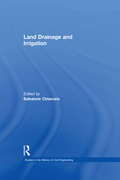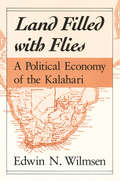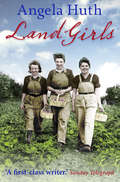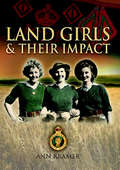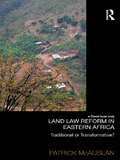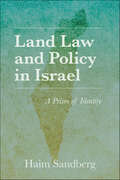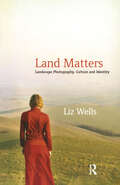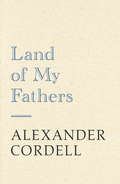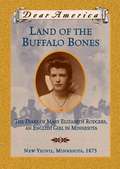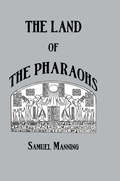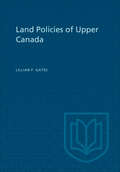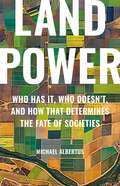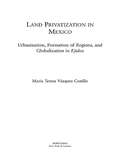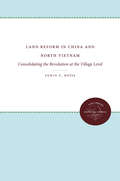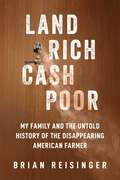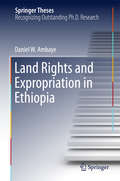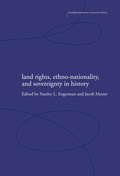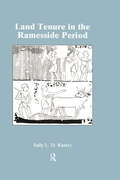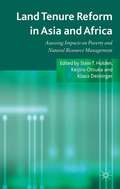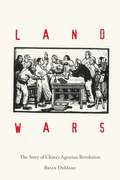- Table View
- List View
Land Drainage and Irrigation (Studies in the History of Civil Engineering #No. 3)
by Salvatore CiriaconoMan’s control over the elements of land and water for the purposes of agriculture was fundamental to the development of civilisations in the past, and remains so today. This volume deals with the processes of irrigation, and land drainage and reclamation, and illustrates the variety of technological and engineering solutions in a wide chronological and geographical perspective. The sophistication of many pre-modern systems is clear, as is the impact of modern technologies. Important points that emerge are that there was no steady or linear progression in techniques across time - instances of the transfer of ideas are balanced by cases of independent development - and that the correlations between irrigation systems and social structures demand more complex explanations than often proposed.
Land Filled with Flies: A Political Economy of the Kalahari
by Edwin N. Wilmsen"The image of a pristine isolation has been almost as common in research on foragers as in the popular media. Land filled with Flies is a sustanined argument against such views. Wilmsen marshals an enormous quantity of historical, archival, archeological, ethnographic, and survey data on the Kalahari Zhu to show how far from the reality these images are, how they have their own historical provenance, how they have been analytically distorting, and how they have proven politically pernicious for living groups like the Zhu."—Pauline Peters, Science "[A] major work. . . . Anthropologists will, and should, use Wilmsen's meticulously detailed study to revise their early lectures in the introductory course, and no future study of African 'foragers' should ignore it."—Parker Shipton, American Anthropologist "An impressive book. . . . The reader need only read the first few pages to judge both the quality and ambitiousness of the work. . . . Essential reading."—David R. Penna, Africa Today
Land Girls
by Angela HuthWith the country's men at war, it falls to the land girls to pitch in and do their bit...Stella arrives at Hallows Farm in her Rayon stockings, having just waved goodbye to the love of life - naval officer Philip. Agatha has just graduated from Cambridge; life on the Farm is certainly going to offer her a different kind of education. Prue, a hairdresser from Manchester, is used to painting the town red, not manual labour. Joe dreams of leaving the family farm and becoming a fighter pilot. But with the arrival of these three beautiful young women, there's enough to keep him busy on the farm for the time being...Work is hard and the effects of war start to take their toll on the three women. But as the bonds of friendship start to form and excitement builds as the RAF dance looms, maybe life in the countryside isn't so bad after all?
Land Girls & Their Impact
by Ann Kramer"The impact of the land girls cannot be ignored. It was not just that women were working and farms had more women than men, women who were not part of the family or, for some of them, had even lived in the countryside before – but women were wearing trousers and filling in for men, some of whom would never return from war. For the women, their time as land girls changed their lives and how they viewed their own role in society and the family. Using original interviews and photographs from some of these land girls, historian Ann Kramer delves deeper than any previous study to understand the role of the land girls both during and after the Second World War."
Land Girls (Isis Cassettes Ser.)
by Angela HuthWith the country's men at war, it falls to the land girls to pitch in and do their bit...Stella arrives at Hallows Farm in her Rayon stockings, having just waved goodbye to the love of life - naval officer Philip. Agatha has just graduated from Cambridge; life on the Farm is certainly going to offer her a different kind of education. Prue, a hairdresser from Manchester, is used to painting the town red, not manual labour. Joe dreams of leaving the family farm and becoming a fighter pilot. But with the arrival of these three beautiful young women, there's enough to keep him busy on the farm for the time being...Work is hard and the effects of war start to take their toll on the three women. But as the bonds of friendship start to form and excitement builds as the RAF dance looms, maybe life in the countryside isn't so bad after all?
Land Girls at the Wartime Bookshop: Book 2 in the uplifting WWII saga series about a community-run bookshop, from the bestselling author (The Wartime Bookshop #2)
by Lesley EamesThe residents of Churchwood have never needed their bookshop, or its community, more. But when the bookshop comes under threat at the worst possible time, can Alice, Kate and Naomi pull together to keep spirits high?Kate has always found life on Brimbles Farm difficult, but now she is struggling more than ever to find time for the things that matter to her - particularly helping to save the village bookshop and seeing handsome pilot Leo Kinsella. Can two Land Girls help? Or will they be more trouble than they're worth?Naomi has found new friends and purpose through the bookshop and is devastated when its future is threatened. But when she begins to suspect her husband of being unfaithful, she finds her attention divided. With old insecurities rearing up, she needs to uncover the truth.Alice has a lot on her plate. Can she fight to save the bookshop while also looking for a job and worrying about her fiancé Daniel away fighting in the war?Land Girls at the Wartime Bookshop is the second novel in the uplifting Wartime Bookshop series, perfect for fans of Donna Douglas and Elaine Everest.**The fourth novel, Evacuees at the Wartime Bookshop, is available to pre-order now!**-------------------------------**Real readers are LOVING The Wartime Bookshop series**'BRILLIANT''Oh I loved this book... please carry on the good writing''Wow what a brilliant start to a new series''Outstandingly fabulous, warm and inviting... so glad there is going to be a follow-on''I was only two pages in when I knew this would be a 5 star read... I honestly can't put my excitement into words at the thought of reading the next one'
Land Law Reform in Eastern Africa: A critical review of 50 years of land law reform in Eastern Africa 1961 – 2011 (Law, Development and Globalization)
by Patrick McAuslanLand Law Reform in East Africa reviews development and changes in the statutory land laws of 7 countries in Eastern Africa over the period 1961 – 2011. The book is divided into two parts. Part 1 sets up the conceptual framework for consideration of the reforms, and pursues a contrast between transformational and traditional developments; where the former aim at change designed to ensure social justice in land laws, and the latter aim to continue the overall thrust of colonial approaches to land laws and land administration. Part 2 provides an in-depth and critical survey of the land law reforms introduced into each country during the era of land law reform which commenced around 1990. The overall effect of the reforms has, Patrick McAuslan argues, been traditional: it was colonial policy to move towards land markets, individualisation of land tenure and the demise of customary tenure, all of which characterise the post 1990 reforms. The culmination of over 50 years of working in this area, Land Law Reform in East Africa will be invaluable reading for scholars of land law, and of law and development more generally.
Land Law and Policy in Israel: A Prism of Identity (Perspectives on Israel Studies)
by Haim SandbergAs one of the smallest and most densely populated countries in the world, the State of Israel faces serious land policy challenges and has a national identity laced with enormous internal contradictions. In Land Law and Policy in Israel,Haim Sandberg contends that if you really want to know the identity of a state, learn its land law and land policies.Sandberg argues that Israel's identity can best be understood by deciphering the code that lies in the Hebrew secret of Israeli dry land law. According to Sandberg, by examining the complex facets of property law and land policy, one finds a unique prism for comprehending Israel's most pronounced identity problems.Land Law and Policy in Israel explores how Israel's modern land system tries to bridge the gaps between past heritage and present needs, nationalization and privatization, bureaucracy and innovation, Jewish majority and non-Jewish minority, legislative creativity and judicial activism. The regulation of property and the determination of land usage have been the consequences of explicit choices made in the context of competing and evolving concepts of national identity. Land Law and Policy in Israel will prove to be a must-read not only for anyone interested in Israel but also for anyone who wants to understand the importance of land law in a nation's life.
Land Matters: Landscape Photography, Culture and Identity (International Library Of Cultural Studies)
by Liz WellsIn this major work on landscape photography, extensively illustrated in colour and black & white, Liz Wells is concerned with the ways in which photographers engage with issues about land, its representation and idealisation. She demonstrates how the visual interpretation of land as landscape reflects and reinforces contemporary political, social and environmental attitudes. She also asks what is at stake in landscape photography now through placing critical appraisal of key examples of work by photographers working in, for example, the USA, in Europe, Scandinavia and Baltic areas, within broader art historical and political concerns. This illuminating book will interest readers in photography and media, geography, art history and travel, as well as those concerned with environmental issues.
Land Of My Fathers
by Alexander CordellSet against the background of the Chartist rebellion, LAND OF MY FATHERS is a heartfelt evocation of the greatest iron town in the world, Merthyr, and of the people who made it so: foundry-owners and workers, immigrants, fortune-hunters, idealists, prostitutes and wastrels. It is also the story of one man, Taliesin Roberts, robust, determined, passionate - and of a three-sided love that will never die.
Land Of My Fathers
by Alexander CordellSet against the background of the Chartist rebellion, LAND OF MY FATHERS is a heartfelt evocation of the greatest iron town in the world, Merthyr, and of the people who made it so: foundry-owners and workers, immigrants, fortune-hunters, idealists, prostitutes and wastrels. It is also the story of one man, Taliesin Roberts, robust, determined, passionate - and of a three-sided love that will never die.
Land Of The Buffalo Bones: The Diary Of Mary Elizabeth Rodgers, An English Girl In Minnesota, New Yeovile, Minnesota 1873 (Dear America Ser.)
by Marion BauerThe diary of Mary Rodgers, known as Polly, details her family's experiences in their journey from England to the Minnesota prairie, where her father hopes to find religious freedom and fertile land.
Land Of The Pharaohs: Drawn With Pen And Pencil
by ManningFirst published in 2005. Routledge is an imprint of Taylor & Francis, an informa company.
Land Policies of Upper Canada
by Lillian F. GatesFrom 1763 to 1867 the land system of Upper Canada was one of the most important questions in the development of the new country. This detailed study of the subject examines Great Britain's plans for Canada after the conquest, the problems created by the royal "promise" of land to the loyalists, Lord Durham's Report, and the failure of the land policies to reach their economic and political objectives. In addition it covers the land problems in Canada after responsible government was achieved: Clergy Reserves, untenanted and abandoned land, settlement duties, speculation, wild land tax and assessment, and the activities of squatters. Based on Colonial Office depsatches, legislative records, the Crown Land Papers, newspapers and various private collections of documents, this work offers an accurate account of the social, economic and political aspects related to land policy in nineteenth-century Upper Canada.
Land Power: Who Has It, Who Doesn't, and How That Determines the Fate of Societies
by Michael AlbertusAn award-winning political scientist shows that a society&’s path to prosperity, sustainability, and equality depends on who owns the land For millennia, land has been a symbol of wealth and privilege. But the true power of land ownership is even greater than we might think. In Land Power, political scientist Michael Albertus shows that who owns the land determines whether a society will be equal or unequal, whether it will develop or decline, and whether it will safeguard or sacrifice its environment. Modern history has been defined by land reallocation on a massive scale. From the 1500s on, European colonial powers and new nation-states shifted indigenous lands into the hands of settlers. The 1900s brought new waves of land appropriation, from Soviet and Maoist collectivization to initiatives turning large estates over to family farmers. The shuffle continues today as governments vie for power and prosperity by choosing who should get land. Drawing on a career&’s worth of original research and on-the-ground fieldwork, Albertus shows that choices about who owns the land have locked in poverty, sexism, racism, and climate crisis—and that what we do with the land today can change our collective fate. Global in scope, Land Power argues that saving civilization must begin with the earth under our feet.
Land Privatization in Mexico: Urbanization, Formation of Regions and Globalization in Ejidos
by Maria Teresa Vázquez-CastilloThis book analyzes [ejido] land as space of urbanization and location of economic activities and capital and land privatization as a redistributive process with local, urban, regional and global consequences.
Land Reform in China and North Vietnam: Consolidating the Revolution at the Village Level
by Edwin E. MoïseThis first book to consider land reform in both countries show that reform, as the Communists have conducted it, can be justified in China and North Vietnam for both economic reasons and ideological imperatives. Moise argues that the violence associated with land reform was as much a function of the social inequities that preceded reform as it was of the reform policy itself and explains the difficulties the Communist leaders encountered in developing a successful program.Originally published in 1983.A UNC Press Enduring Edition -- UNC Press Enduring Editions use the latest in digital technology to make available again books from our distinguished backlist that were previously out of print. These editions are published unaltered from the original, and are presented in affordable paperback formats, bringing readers both historical and cultural value.
Land Rich, Cash Poor: My Family's Hope and the Untold History of the Disappearing American Farmer
by Brian ReisingerThe hidden history of an economic and cultural crisis that is threatening our very food supply—the disappearance of the American farmer. Taking on this working-class story of heart and hardship, award-winning writer Brian Reisinger weaves forgotten eras of American history with his own family&’s four-generation fight for survival in Midwestern farm country. Readers learn the truth about America&’s most detrimental and unexplained socioeconomic crisis: How the family farms that feed us went from cutting a middle-class path through the Great Depression to barely making ends meet in modern America. Along the way, they&’ll see what it truly takes to feed our country: accidents that can kill or maim; weather that blesses or threatens; resilience in the face of crushing economic crises, from depressions and recessions to COVID-19; and the tradition that presses down on each generation when you're not just fighting for your job, you're fighting for your heritage. With newly analyzed data, sharp historical analysis, conversations with some of modern farming&’s most notable champions and critics alike, honest debate, and personal storytelling, Reisinger reveals how the hollowing out of rural America is affecting every single American dinner table. Food prices soaring far beyond the rate of inflation, a vulnerable food supply chain, environmental and ecological dilemmas, the security of our farmland from foreign adversaries, a mental health crisis that includes farmer suicides and addictions, a deepening urban-rural divide, and more worries than ever about what&’s for dinner. These are all becoming the hallmarks of a food system that has long stood as a modern miracle. Land Rich, Cash Poor offers the honest truth about these issues, and a candid look at what we can do about them—before it&’s too late.
Land Rights and Expropriation in Ethiopia
by Daniel W. AmbayeThis thesis provides a new approach to the Ethiopian Land Law debate. The basic argument made in this thesis is that even if the Ethiopian Constitution provides and guarantees common ownership of land (together with the state) to the people, this right has not been fully realized whether in terms of land accessibility, enjoyability, and payment of fair compensation in the event of expropriation. Expropriation is an inherent power of the state to acquire land for public purpose activities. It is an important development tool in a country such as Ethiopia where expropriation remains the only method to acquire land. Furthermore, the two preconditions of payment of fair compensation and existence of public purpose justifications are not strictly followed in Ethiopia. The state remains the sole beneficiary of the process by capturing the full profit of land value, while paying inadequate compensation to those who cede their land by expropriation. Secondly, the broader public purpose power of the state in expropriating the land for unlimited activities puts the property owners under imminent risk of expropriation.
Land Rights, Ethno-nationality and Sovereignty in History (Routledge Explorations in Economic History)
by Stanley L. Engerman Jacob MetzerThe complex relationships between ethno-nationality, rights to land, and territorial sovereignty have long fed disputes over territorial control and landed rights between different nations, ethnicities, and religions. These disputes raise a number of interesting issues related to the nature of land regimes and to their economic and political implications. The studies drawn together in this key volume explore these and related issues for a broad variety of countries and times. They illuminate the diverse causes of ethno-national land disputes, and the different forms of adjustment and accommodation to the power differences between the contesting groups. This is done within a framework outlined by the editors in their analytical overview, which offers contours for comparative examinations of such disputes, past and present. Providing conceptual and factual analyses of comparative nature and wealth of empirical material (both historical and contemporary), this book will appeal to economic historians, economists, political scientists, sociologists, anthropologists and all scholars interested in issues concerning ethno-nationality and land rights in historical perspective.
Land Rights, Ethno-nationality and Sovereignty in History (Routledge Explorations in Economic History)
by Stanley L. Engerman Jacob MetzerThe complex relationships between ethno-nationality, rights to land, and territorial sovereignty have long fed disputes over territorial control and landed rights between different nations, ethnicities, and religions. These disputes raise a number of interesting issues related to the nature of land regimes and to their economic and political implications.The studies drawn together in this key volume explore these and related issues for a broad variety of countries and times. They illuminate the diverse causes of ethno-national land disputes, and the different forms of adjustment and accommodation to the power differences between the contesting groups. This is done within a framework outlined by the editors in their analytical overview, which offers contours for comparative examinations of such disputes, past and present.Providing conceptual and factual analyses of comparative nature and wealth of empirical material (both historical and contemporary), this book will appeal to economic historians, economists, political scientists, sociologists, anthropologists and all scholars interested in issues concerning ethno-nationality and land rights in historical perspective.
Land Rover: Military Versions of the British 4x4 (LandCraft)
by Ben SkipperA richly illustrated guide to modeling the military Land Rover, filled with previously unseen inspirational photographs and drawings.The Land Rover was originally designed to fill a gap in the Rover Car Company’s post-war product portfolio. Initially based on Willy’s-Overlands Jeep, the now-legendary Land Rover was adopted by armed forces across the globe almost immediately. By its sixtieth anniversary in 2008 the Land Rover was serving as a combat vehicle and as a first responder platform.This unique LandCraft title looks into the Land Rover’s development during the immediate post-war years, to its development and growth as a military vehicle synonymous with versatility. The book charts how the Land Rover evolved into unique military-only variants.The book also examines how this modest 4x4 grew from an innocuous Cold War cargo vehicle into a weapons platform supporting troops in the deserts of South West Asia. The military Land Rover truly offers the modeler an exciting range of subject, era and theatre choices.“A welcome addition to the very popular Land Craft Series. Aimed at model makers, this series has become popular with a much wider readership, due to the excellent text describing the subject vehicle and its deployment, including unit structures—Very Highly Recommended.” —Firetrench“All in all this is a great, compact reference work for modelers heading off on a Land Rover safari. It’s not overwhelming, provides good recommendations and fair assessments of products while presenting fantastic reference material to help the modeler get motivated and also providing enough up close detail to be helpful.” —AMPS
Land Tenure In The Ramesside
by Sally L.D. KataryFirst published in 1989. Previous commentators on the Wilbour Papyrus have been daunted by the vast quantity of data presented in its assessment of land tenure in Middle Egypt during the reign of Ramesses V- data which has the potential to shed light upon many facets of economic life in Ramesside Egypt, but which has so far defied any but the broadest of generalisations. For the first time, Sally Katary has approached this important document armed with the techniques of modern statistical analysis, establishing a framework within which the socio-economic data contained in the Papyrus may be retrieved, analysed and evaluated in order to draw inferences concerning the workings of the Egyptian agricultural economy during the Twentieth Dynasty. Her study then relates the data of the Wilbur Papyrus to contemporary and near-contemporary economic and administrative documents in order to give the data an historical context and concludes by outlining future avenues of research and the appropriate methodology with which to pursue them.
Land Tenure Reform in Asia and Africa
by Klaus Deininger Keijiro Otsuka Stein T. HoldenRural poverty remains widespread and persistent in South Asia and Sub-Saharan Africa. A group of leading experts critically examines the impact of land tenure reforms on poverty reduction and natural resource management in countries in Africa and Asia with highly diverse historical contexts.
Land Wars: The Story of China's Agrarian Revolution
by Brian DeMareMao Zedong's land reform campaigns comprise a critical moment in modern Chinese history, and were crucial to the rise of the CCP. In Land Wars, Brian DeMare draws on new archival research to offer an updated and comprehensive history of this attempt to fundamentally transform the countryside. Across this vast terrain loyal Maoists dispersed, intending to categorize poor farmers into prescribed social classes, and instigate a revolution that would redistribute the land. To achieve socialist utopia, the Communists imposed and performed a harsh script of peasant liberation through fierce class struggle. While many accounts of the campaigns give false credence to this narrative, DeMare argues that the reality was much more complex and brutal than is commonly understood—while many villagers prospered, there were families torn apart and countless deaths. Uniquely weaving narrative and historical accounts, DeMare powerfully highlights the often devastating role of fiction in determining history. This corrective retelling ultimately sheds new light on the contemporary legacy of land reform, a legacy fraught with inequality and resentment, but also hope.
